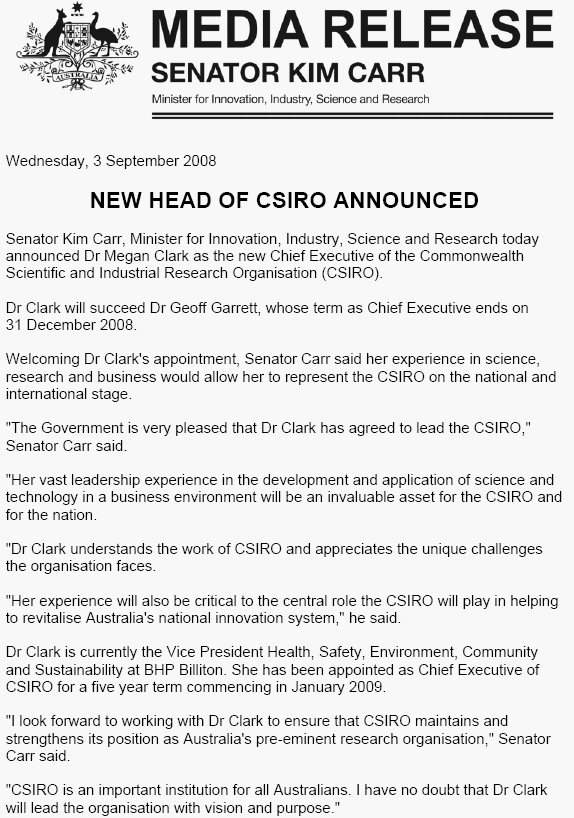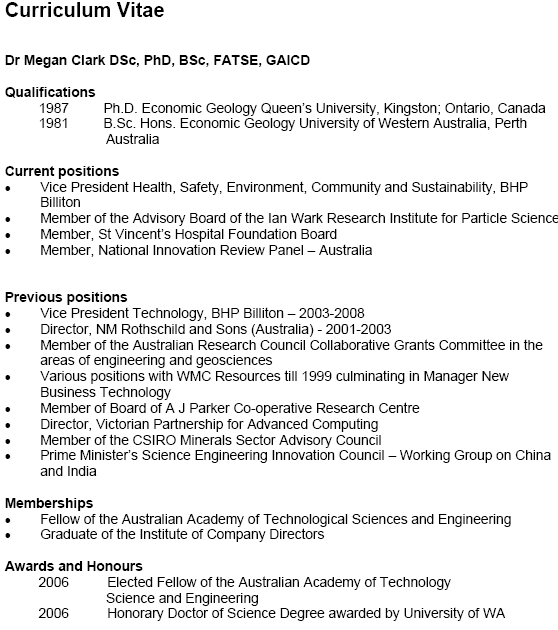|
|
|
|
|
|
|
News & Views item - September 2008 |
![]() Former
Vice President, Technology, BHP Billiton Appointed CSIRO Chief Executive.
(September 3, 2008)
Former
Vice President, Technology, BHP Billiton Appointed CSIRO Chief Executive.
(September 3, 2008)
 Dr.
Megan Clark has been appointed to a five-year term to replace Dr Geoff Garrett
as chief executive of the Commonwealth Scientific and Industrial Research
Organisation (CSIRO) to take effect on Dr Garrett's retirement on December 31,
2008.
Dr.
Megan Clark has been appointed to a five-year term to replace Dr Geoff Garrett
as chief executive of the Commonwealth Scientific and Industrial Research
Organisation (CSIRO) to take effect on Dr Garrett's retirement on December 31,
2008.
The full media release is reproduced here:

Time will tell whether or not CSIRO under Dr Clark as its chief executive will turn around to become an outstanding research organisation with the breadth and excellence it assumed before the death of a thousand cuts it has been heir to over the past 30+ years.
The short description of Dr Clark's professional progress reads: Dr Clark began her career as a mine geologist and subsequently worked in mineral exploration, mine geology, R&D management, venture capital and technical strategy areas with WMC Resources over a 15 year period.
From 2003 to June 2008, Dr Clark was the Vice President Technology, BHP Billiton. Since July 2008 she has been Vice President, Health, Safety, Environment, Community and Sustainability, BHP Billiton.
Whether or nor this move sideways this past June for Dr Clark is of any significance regarding her taking over Australia's preeminent public science body is anyone's guess.
The CV furnished by Senator Carr's department reads:

Frankly, these data suggest that Senator Carr's search committee has had a difficult time finding outstanding candidates who were prepared to take on the job.
But perhaps the summary of a plenary address Dr Clark gave in November last year at RMIT to the Partnerships for World Graduates Conference may indicate her philosophy. It remains to be seen how able she is in usefully moulding CSIRO to it.
_________________________________________________
The Rules Have Changes in the Global Arena
Dr Megan Clark, BHP Billiton, Australia
The minerals industry is facing the strongest demand for innovation in its
history. This is being driven by the need for raw materials and energy by the
developing world. The challenge is to meet this demand safely and in a
sustainable way.
Throughout history, economic development goes hand in hand with increasing raw material and energy consumption. They are the critical ingredients of economic and social development. Providing affordable raw materials and energy - on a sustainable basis will contribute to global prosperity. While energy efficiency may increase, the huge number of people entering the global economy, and their emerging prosperity will cause the absolute level of energy consumption to grow dramatically. Similar trends are clear in the metals and other raw materials.
The magnitude of this increased consumption is enormous when we consider
that over the next 25 years world consumption of copper will exceed all of the
copper mined today. Meeting this demand requires capital investment in bringing
new resources to market. BHP Billiton has a deep inventory of new growth
projects; US$14.3 billion of projects in execution a further US$6.6 billion in
feasibility and most importantly some $50 billion of future new project options.
Over a quarter of our future options require technology that will allow us to
treat lower grade ores, process more complex ores or to go deeper pits and
mines.
We consider five elements that are critical to delivering a consistent pipeline
of growth options to our businesses. These are an engagement with fundamental
science to identify and deliver significant breakthroughs; a deep understanding
of our internal businesses; recognition of potential discontinuities that can
unlock new assets, new resources and new deposits; market recognition of the
value of the innovation capability and the application of science and technology
to sustainable development and humankind.
We cannot do this without the brightest minds working together and that is where our global network comes in. Every one of our innovation and technology developments brings together a network of global researcher with our internal cross-disciplinary teams.
It is unthinkable for a company the size of BHP Billiton, focussed on long term
value to achieve its growth plans and meet the demand for raw materials that
underpin economic development without a strong engagement in innovation,
technology and fundamental research.
[Note added September 5, 2008: Anna Salleh reports in ABC Science that Dr Geoff Garrett's "controversial leadership is widely seen as shifting CSIRO towards a focus on short-term research with a commercial outcome. CSIRO has also suffered a loss of government funding in real terms, and a decline in staff morale, say commentators".
Former chief of CSIRO Division of Entomology, Dr Max Whitten told Dr Salleh: "I think one of the challenges for Megan Clark is to get Kim [Carr] to ... show that he really cares about CSIRO like he cares about his green car program," and then went on to say, "There is a serious morale problem within the organisation over a sense of identity... I hope she [Clark] recognises there are multiple pathways through to getting a return on your buck which is not just through royalties."]